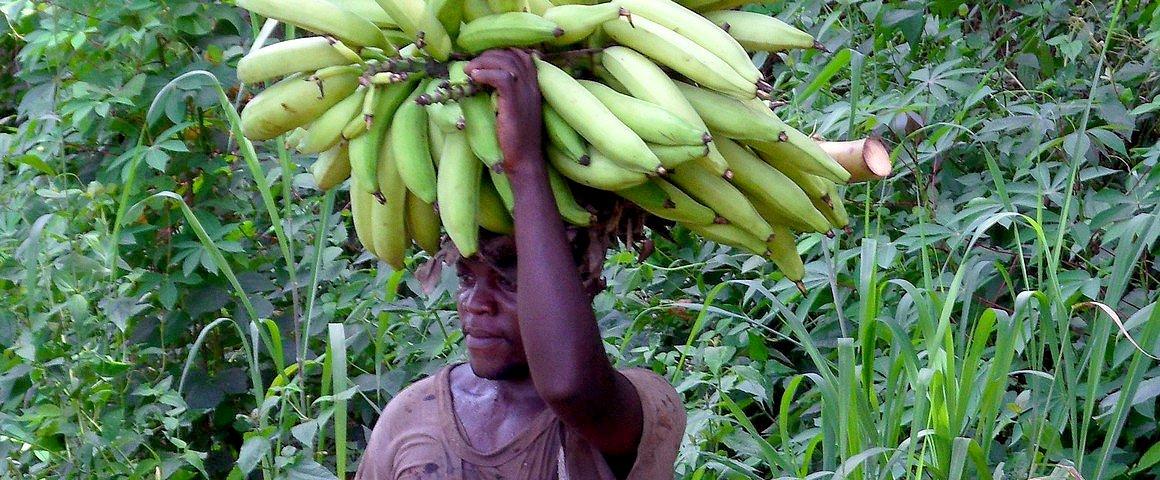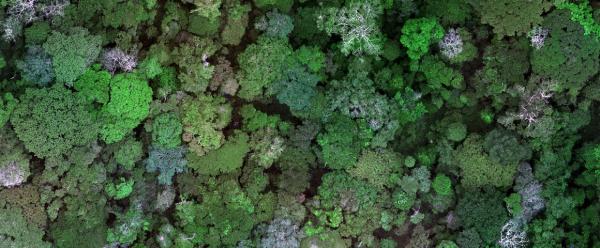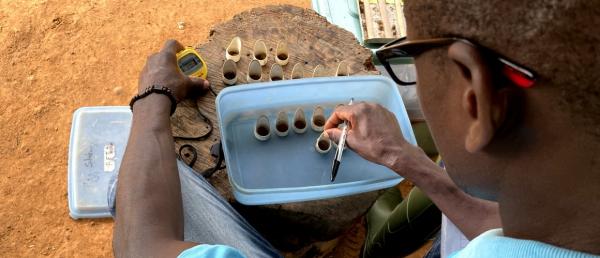Results & impact 23 April 2024
- Home
- CIRAD news
- News
- Plantain banana, zero-pesticide intensification
Plantain banana: zero-pesticide intensification is feasible!

In West and central Africa, demand for plantain bananas is double the current supply © S. Dépigny, CIRAD
Trapping banana weevils, staking banana plants and suckering at an early stage are some of the ways of making plantain banana growing more efficient, profitable and pesticide-free. The FABA project team has identified 13 issues across the various stages of plantain banana growing: from the choice of variety at the time of planting to harvesting, through banana plant positioning, upkeep and pest management.
Novel, open-access, inclusive teaching tools for every stage of cultivation
Each of the 13 issues is addressed by means of three teaching tools: a video tutorial showing the techniques for each cropping practice; a "producer" sheet in the form of a graphic summary of the video; and a "teaching" sheet for trainers, showing how to use the first two tools. This package is due to be supplemented by a handbook on zero-pesticide plantain banana growing. These open-access teaching tools have been published on the project website at a rate of one issue per month, since March 2023. They are intended for producers, trainers and agricultural advisors.
The example of Cameroon
Plantain banana is one of 12 priority crops targeted in the 2020-2030 Cameroon National Agricultural Plan. The country is aiming to double production by 2030. "The Government is not looking to extend the area planted indiscriminately, but to sustainably intensify production on small areas", says Eric Avom Alara, coordinator of Cameroon's Fruit Tree Cultivation Development Support Programme (PNDCF). "This means building players' skills in terms of sustainable plantain banana intensification. The FABA project therefore arrived at just the right time to help achieve this."
Following a workshop in Cameroon in June, the decision was taken to organize seven workshops this autumn to train advisors and producers in plantain banana production, packing and transport for both local and export markets. An MOU is being drafted with a view to training Cameroonian trainers in sustainable, intensive plantain banana production using the teaching tools developed by the FABA project.
African plantain bananas grown by smallholders
In central and West Africa, more than 130 plantain banana varieties are grown, eaten and used in various ways. More than two million farmers produce 10 million tonnes* of plantain bananas each year, mainly on small farms. Those bananas are generally grown alongside food crops or cash crops such as cocoa. These cropping systems generally make little use of inputs and pesticides, but production is neither high nor consistent.
Demand is twice as high as supply
Demand is high. Plantain bananas are eaten with many everyday dishes, but also have good potential for processing: they are highly sought after for producing crisps, bread or baby foods. However, processing firms require a consistent, quality supply, which is currently an issue, as the production sector is largely unstructured. "We estimate that Cameroon needs to double its annual output to satisfy demand from consumers and processors", says Sylvain Dépigny, CIRAD agronomist and FABA Project Coordinator. "This makes plantain banana growing an attractive opportunity, and one that producers are keen to grasp by specializing their production system and growing plantain banana more intensively. Our teaching tools will support intensification, using agroecological innovations rather than pesticides."
From research… to producer
The teaching tools produced by the FABA project are the result of interdisciplinary work by researchers, agronomists specializing in plantain banana, trainers specializing in agriculture and agricultural advisory services, and producers from Cameroon, Ivory Coast and France. They were designed to be used freely for self-study and/or as a tool to train groups or producers or students.
The FABA project is coordinated by CIRAD backed by Institut Agro Montpellier and the FAR network, with financial support from the French Ministries for Europe and Foreign Affairs – via its solidarity fund for innovative projects (FSPI) – and of Agriculture and Food Sovereignty. The teaching tools were developed with support from CIRAD's MUSC platform and the FAR network.
* according to the journal Fruitrop
The IPA initiative, for the ecological intensification of plantains in Africa, was launched by CIRAD and its partners on 1 March 2022, at the Paris International Agricultural Show. It associates 15 partners in central and West Africa and France and is leading calls for more efficient, zero-pesticide plantain banana growing. The Salon international de l’Agriculture et des Ressources Animales (SARA) currently being held in Abidjan, Ivory Coast, will see the IPA initiative enter its second phase.

























_c.chabrier.jpg)
